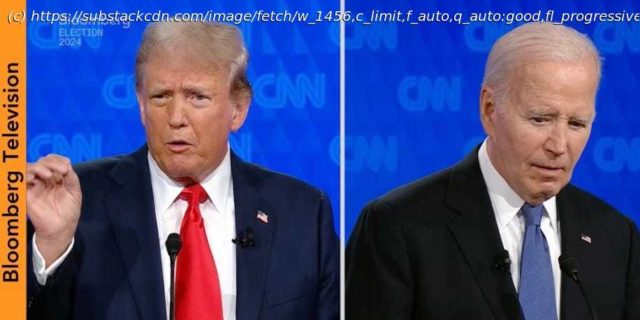Kill the chicken to scare the monkey: Trump should fire heads of FBI, Fed, and military on day one
Donald Trump easily won Thursday’s debate, besting a sputtering, often-incoherent Joe Biden who had little to offer the American people but fumbled talking points and bluster. In contrast, a confident and relaxed Trump offered a way back to the Three Fat Years of economic growth and peace that punctuated his presidency while sidestepping irrelevant “gotcha” issues that matter to the political class but not to average voters.
Trump easily jumped traps that CNN’s operatives attempted to set for him. He turned a question about the January 6 riot into a comparison between America then versus America now. He flipped a gotcha question about abortion to spotlight Democrats’ advocacy for late-term abortion. Biden twice fumbled responses to this sole issue that is supposed to be Democrats’ ace up the sleeve. Trump even sounded unifying on the matter.
When goaded to say he would persecute those who have persecuted him, including Biden’s Justice Department and partisan prosecutors in New York and Atlanta, Trump admirably remarked, “My retribution is going to be success.” He transcended a stupid question about climate change to mention instead the reality that black Americans have suffered under Biden after benefitting from real wage growth under Trump.
Trump deftly turned foreign policy questions back to his many successes, including backfooting the Iranian regime that has subsequently run wild across the Middle East during the Biden administration. He also reminded voters he made Europe pay more for its own defense—a contrast to Biden’s Europe-first foreign policy where the United States must pay for the defense of Ukraine and the rest of Europe.
Beyond partisanship, Biden’s performance was personally sad. No American should want his president to look so feeble anywhere, much less with much of the country and world watching. The people who put Biden up to running again that led him to the stage on Thursday are guilty of the crime of elder abuse.
The debate’s host, political tabloid CNN, also reminded viewers why its ratings are terrible—at one point this year trailing a channel founded by late televangelists Jim and Tammy Faye Bakker that plays Westerns.
CNN’s operatives—Dana Bash and Jake Tapper—tried to help Biden and hurt Trump and Biden still failed. They downplayed the border crisis and crime wave Biden has created. They tried unsuccessfully to enmesh Trump in January 6 issues. They fretted about the progressives’ religion of climate change alarmism. They focused on what matters to CNN, not to normal people.
Their performance is the latest waypoint in the journey of presidential debates from interesting and helpful to pointless and painful TV. Bash and Tapper typified the sullen scolds of the establishment that stand in opposition to the reformer Trump. Sad, gray, dumpy, and untalented.
Nothing tonight changed the trajectory of a campaign that is pointing toward another Trump presidency. If anything, Trump’s momentum increased. Voters did not learn anything new about the two candidates with well-known and easily contrasted records as president and cognitive health.
Of course, it is too early to know for certain if Trump will get a second term. However, polls compiled at RealClearPolitics show him winning swing states and the electoral college handily and, narrowly, the popular vote as well. Without taking anything for granted, it worth discussing what will happen if Trump wins.
Specifically, how can Trump use his first 100 days to shock and awe the government and country, and begin to allay the concerns of voters who, according to RealClearPolitics, believe by 64 to 26 percent that the country is on the wrong track?
Ever since Franklin Roosevelt used the phrase “first 100 days” and called Congress into a special session in which it passed dozens of laws to mitigate the Great Depression, presidents have been judged by their first stretch in office.
Ronald Reagan had the next-most consequential beginning of his presidency, taking just over 100 days to enact tax cuts and propose government spending limitations despite the impediments of being shot and having a House of Representatives run by the other party. Reagan cut top income taxes from 70 to 50 percent (they would top out at 28 percent when he left office), which was a massive stimulus to the supply side of the economy—the productive portion not reliant on government spending.
Reagan also provided political cover to Federal Reserve Chairman Paul Volcker’s severe increases in interest rates to control high inflation. The interim result was a sharp recession, but they tamed inflation. That combined with Reagan’s freeing of the supply side of the economy allowed the private sector to begin rapid growth in time for Reagan’s landslide reelection—an expansion that outlasted Reagan’s presidency and shaped the modern economy. Reagan’s first 100-plus days had a more lasting impact on the nation than Roosevelt’s, which consisted mostly of try-anything activities to create the appearance of solving the Depression while saving capitalism politically. (More lasting Roosevelt legacies like Social Security came later.)
Trump’s first 100 days in office beginning January 20, 2017 have not inspired historians to make similar comparisons.






